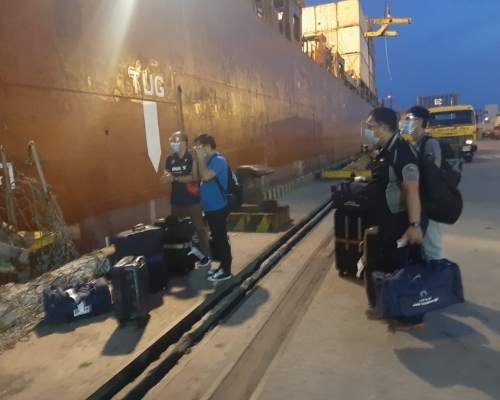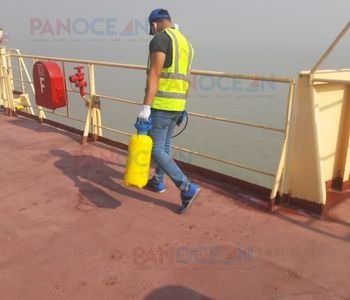In the world of maritime trade, the legal framework of admiralty law plays a critical role in resolving disputes and upholding the rights of shipowners and charterers. In Bangladesh, a country with a rich maritime heritage and bustling ports like Chattogram and Mongla, navigating admiralty law can be a complex endeavor. While P&I Correspondents and lawyers are often sought after for legal support, the indispensable role of shipping agents in representing shipowners and charterers in Bangladesh’s admiralty courts cannot be understated.
Admiralty Law in Bangladesh: An Overview:
Admiralty law in Bangladesh encompasses a wide range of legal principles and regulations related to maritime activities. It includes matters such as vessel ownership, collision claims, salvage operations, cargo disputes, and the arrest of vessels. Admiralty law in Bangladesh is influenced by international conventions and local regulations, making it a complex and specialized field.
When Can a Vessel Be Arrested in Bangladesh?
The power to arrest a vessel is a significant tool under admiralty law, and it can be initiated under specific circumstances. Here are common scenarios in which a vessel can be arrested in Bangladesh:
1. Unpaid Debts:
- One of the most common reasons for vessel arrest is unpaid debts. If a shipowner, operator, or charterer fails to meet financial obligations, such as unpaid port dues, bunker fuel bills, or crew wages, the aggrieved party may seek to arrest the vessel as security for the debt.
2. Cargo Claims:
- Disputes related to cargo damage or loss can lead to vessel arrests. If a cargo owner believes that their cargo has been damaged or lost due to the actions of the vessel or its crew, they may seek to arrest the vessel to secure compensation.
3. Collision Claims:
- In cases of collisions between vessels, the innocent party may arrest the other vessel as security for potential damages. This allows the innocent party to protect their interests while the collision claim is adjudicated.
4. Salvage Claims:
- Salvage claims can arise when a vessel or its crew assists another vessel in distress. The salvaging party may seek to arrest the salvaged vessel as security for their salvage award.
5. Disputes Over Maritime Liens:
- Certain maritime claims, known as maritime liens, grant claimants a right to arrest a vessel as security for their claim. Examples of maritime liens include claims for wages, salvage, and collision damage.
Navigating an admiralty case in Bangladesh involves identifying the maritime claim, selecting the appropriate jurisdiction, engaging legal representation, filing a suit in the Admiralty Court, obtaining an arrest warrant if necessary, serving summons, participating in court appearances, engaging in preliminary proceedings, gathering evidence, exploring mediation or settlement options, proceeding to trial if needed, awaiting the court’s judgment, enforcing the judgment, and potentially appealing the decision if dissatisfied with the outcome.
How Is Vessel Arrest Executed?
Vessel arrest in Bangladesh follows a legal process that involves filing a lawsuit in admiralty court. The arresting party, often through legal representation, must present a case that demonstrates a valid claim and the need for vessel arrest as security. Once the court is satisfied, it issues an arrest warrant, allowing authorities to physically detain the vessel until the matter is resolved.
In Bangladesh, a nation with extensive coastlines and a thriving maritime sector, admiralty law is vital for regulating maritime activities and addressing disputes that arise in the realm of shipping.
The Need for Strong Representation:
Shipowners and charterers operating in Bangladesh often require robust representation in admiralty court proceedings. This representation goes beyond the traditional role of P&I Correspondents or lawyers and involves the active involvement of experienced shipping agents. Here’s why strong representation is essential:
1. Local Expertise:
- Shipping agents possess an intimate knowledge of local regulations, customs procedures, and the intricacies of the maritime landscape in Bangladesh. This familiarity is invaluable when navigating the legal complexities of admiralty cases.
2. Relationship Building:
- Over the years, shipping agents have built strong relationships with key players in the maritime industry, including port authorities and customs officials. These connections can expedite legal processes and facilitate smoother operations.
3. Cost-Effective Solutions:
- Shipping agents offer cost-effective solutions for shipowners and charterers, particularly in routine matters and minor disputes. Their expertise ensures that issues are resolved efficiently and economically.
4. Personalized Support:
- Shipping agents provide personalized support tailored to the unique needs of shipowners and charterers. They are more than just service providers; they are trusted partners invested in their clients’ success.
The Role of Shipping Agents in Admiralty Law:
Shipping agents in Bangladesh, with their in-house team of legal experts, shipping professionals, and experienced individuals in admiralty matters, play a multifaceted role in admiralty law cases. Here’s a closer look at their contributions:
1. Immediate Legal Opinions:
- Shipping agents can provide shipowners and charterers with immediate legal opinions on issues such as vessel arrests, release procedures, cargo shortages, and unlawful arrests. This quick response is essential in mitigating potential legal complications.
2. Serving Legal Notices:
- When consignees unlawfully arrest vessels or raise false cargo shortage claims in ports like Chattogram or Mongla, shipping agents step in to serve legal notices, protecting their clients’ interests.
3. Expert Witness and Survey:
- In admiralty court proceedings, having an expert witness is crucial. Shipping agents can act as expert witnesses and support evidence collection, bolstering their clients’ cases.
4. Court Hearings and Liaison:
- Shipping agents manage logistics related to court hearings, maintain strong liaisons with legal professionals, and ensure smooth legal proceedings.
5. Opinion for Written Statements:
- Crafting accurate and compelling written statements is crucial in admiralty law cases. Shipping agents provide expert opinions and support for drafting written statements and partition reports.
Time-barred claims and vessel arrest
Here are some key provisions related to time-barred claims and vessel arrest:
1. Admiralty (Jurisdiction and Settlement of Maritime Claims) Act, 2018:
-
Section 3 – Jurisdiction in Rem: This section of the Act establishes the jurisdiction of the admiralty court to hear cases in rem, which involve claims against vessels. It provides the legal basis for vessel arrests.
-
Section 5 – Maritime Claims: This section lists various maritime claims that can be pursued in admiralty court. It includes claims related to damage to cargo, collision, salvage, wages, and other matters.
-
Section 9 – Time-Barred Claims: Section 9 of the Act addresses the issue of time-barred claims. It stipulates that certain claims have a limitation period within which they must be filed. After the expiration of this period, the claims may become time-barred and cannot be pursued in admiralty court.
-
Section 11 – Arrest of Vessels: This section outlines the circumstances under which a vessel can be arrested in Bangladesh. It provides the legal framework for vessel arrests, including the procedures to be followed.
2. Limitation Act, 1908:
-
The Limitation Act, 1908, is a general law that applies to various civil claims, including those related to admiralty matters. It establishes limitation periods for filing claims in civil courts, including admiralty cases.
-
Section 3 – Limitation of Suits, Appeals, and Applications: This section of the Limitation Act, 1908, sets out the general rules regarding the limitation period for filing suits, including admiralty claims. It is essential to consult this Act for specific time limitations applicable to various types of claims.
3. Other Relevant Regulations:
-
Depending on the nature of the claim, other laws and regulations may also be applicable. For example, claims related to cargo damage may involve provisions from the Carriage of Goods by Sea Act, 1925, and international conventions such as the Hague-Visby Rules.
-
Claims related to collisions may be subject to international conventions like the International Regulations for Preventing Collisions at Sea (COLREGs) and the International Convention for the Unification of Certain Rules of Law relating to Collisions between Vessels (COLLREG).
It’s important to note that the specific time limitations for filing admiralty claims and the procedures for vessel arrest may vary depending on the nature of the claim and the circumstances of each case. Therefore, it is advisable to seek legal counsel or refer to the relevant legal texts for precise details related to time-barred claims and vessel arrest in Bangladesh’s admiralty law
Dependable Support for Admiralty Law Matters:
In Bangladesh’s maritime ports, the complexities of admiralty law can pose significant challenges for shipowners and charterers. While P&I Correspondents and lawyers are valuable assets, shipping agents offer an additional layer of expertise and local knowledge that is often indispensable.
For those seeking dependable and comprehensive support in admiralty law and legal matters within Bangladesh’s maritime ports, experienced shipping agents like Panocean Ltd. stand as ultimate allies. Their in-house team of experts, including individuals well-versed in admiralty law, ensures that shipowners and charterers can navigate the intricacies of admiralty law with confidence, safeguarding their interests and securing favorable outcomes in this vital sector of the maritime industry.









